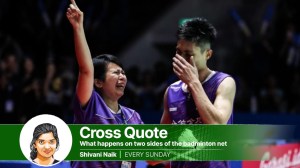Left and right, red and saffron, each plays The Other
As in the VIBGYOR spectrum of colours where orange and red merge into one another, in several roundabouts in central Delhi today saffron and...

As in the VIBGYOR spectrum of colours where orange and red merge into one another, in several roundabouts in central Delhi today saffron and red buntings fluttered together. But as the BJP celebrated its 25th anniversary in Ambedkar Stadium and the CPM inaugurated its 18th Congress at the Talkatora Stadium less than 5 km away, the difference—in colour and mood, style and substance—could not have been starker.
At Talkatora Stadium, renamed E K Nayanar Nagar, the CPM choir sang songs of peasant struggles and workers rights. At Ambedkar Stadium, Bollywood playback singer Kumar Sanu rendered a patriotic number from the film Karma.
At the BJP meet, Atal Behari Vajpayee once again hinted he was about to retire (‘‘I am sad. I can work only up to a limit’’) setting off yet another round of speculation about his real intentions.
At the CPM Congress, Jyoti Basu minced few words. ‘‘I have to sit and speak; I have been ill for quite some time,’’ he said matter-of-factly and then read out his speech in a firm voice.
And at the BJP anniversary, despite the official rejoicing over the party’s achievements in the last 25 years, the sense of despondency from the May 2004 defeat still lingered.
At the CPM Congress, the first to be held after the party delivered its best electoral performance last May and decided to back the UPA government, the mood was of buoyant jubilation.
The cosmetic differences of colour and mood apart, the simultaneous conferences of parties belonging to two ends of India’s ideological spectrum also underlined how much each looks upon the other as Other. If the spectre of communism haunted Ambedkar Stadium, the danger posed by the ‘‘Hindutva forces’’ was the leitmotif of the speeches at Talkatora. CPM politbureau member Prakash Karat, felicitating 11 comrades who had actively participated in India’s freedom struggle, could not resist a dig at the BJP’s “nationalist” credentials. The BJP, he said, in their “entire history” could not produce even one freedom fighter who came “even remotely close’’ to the patriots on the CPM stage.
Back at Amdedkar Stadium, L K Advani described the Communist Party as “’our main ideological adversary’’ and accused the Congress-Communist combine of ‘‘aiding the likely re-partition of India.’’ He also spoke of the “basic Hindu identity of India’s nationhood.’’
CPM leaders Harkishan Singh Surjeet and Jyoti Basu, addressing their own delegates, emphasised that the party’s support to Congress stemmed from its unwavering opposition to the BJP. Said Surjeet, ‘‘The BJP-RSS combine arrogantly thought that 1998 had ushered in a period of dominance for the Hindutva forces. They set about systematically to refashion the Indian state to make it a Hindu rashtra. They did not reckon with the secular and democratic consciousness of the vast mass of our people, the ordinary working people.’’
And Basu added, ‘‘The BJP has vacated office but its pernicious legacy remains. It is necessary to detoxify the system, so that secularism is firmly established.’’
If ideological differences set them apart, organisational affinities make each draw lessons from the other. Both CPM and BJP pride themselves in being “cadre-based mass parties” that do not—like most every other party in India—depend on family succession. The big organisational question before the BJP is how to remain true to its ‘‘core constituency’’ even while expanding its base and appeal. That question—how to balance cadre and mass—confronts the CPM too, especially if it succeeds in growing beyond its loyal but small bases in far corners of the country.
There was another similarity too—both parties spoke of India’s destiny. Advani said, “Destiny has willed the BJP to become stronger to make India stronger.’’ Said Surjeet: ‘‘India as the second largest populous country in the world, is destined to play a major role in the 21st century, provided it can firmly defend national sovereignty, develop its economy by prioritising its national and people’s needs and democratise its highly iniquitous social system.’’
Photos


- 01
- 02
- 03
- 04
- 05





























